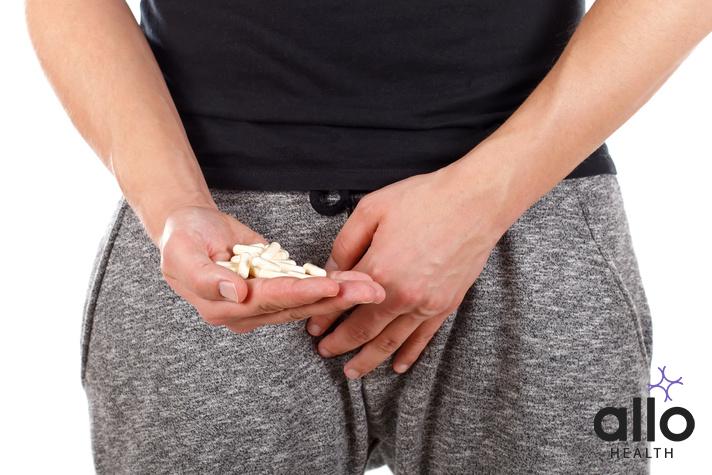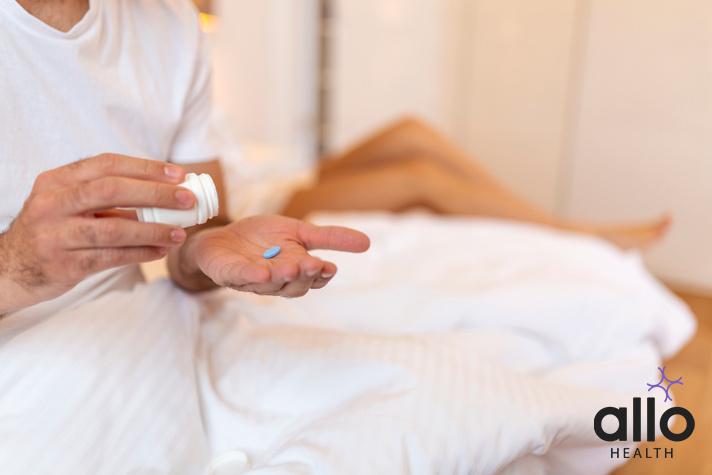Role of Paroxetine for Premature Ejaculation Treatment

Allo Health is dedicated to personalized well-being, offering support and trusted information tailored to individual health goals. The platform emphasizes human-generated content, led by a distinguished medical team of experts, including physicians and sexual health specialists. Their commitment to credibility involves rigorous fact-checking, authoritative research, and continuous updates to ensure accurate, up-to-date information. Allo Health's unique approach goes beyond conventional platforms, providing expert-led insights and a continuous commitment to excellence, with user feedback playing a crucial role in shaping the platform's authoritative voice.

Dr Sanina Mansoor holds MBBS degree from Yenepoya university,Mangalore.She has 8 years of experience working as a medical officer at various health centres and medical colleges.
Why This Was Upated?
Our experts continually monitor the health and wellness space, and we update our articles when new information became available.
Updated on 07 February, 2024
- Article was updated as part of our commitment to diversity, equity, and inclusion.

"The following blog article provides information about a drug or brand name drug and its potential effects or benefits. However, it is crucial to understand that this information is intended for general educational purposes only and should not be considered a substitute for professional medical consultation. It is highly recommended to consult with a qualified healthcare professional before making any decisions regarding medication, treatment, or healthcare management.
Book consultation
Individuals have unique medical conditions, and the information provided in this article may not be applicable to everyone. Only a qualified healthcare provider can evaluate your specific medical situation, taking into account your medical history, conducting appropriate tests, and providing personalized advice and recommendations. They are equipped to make informed decisions tailored to your individual needs.
It is crucial to emphasize that self-diagnosis, self-medication, or disregarding medical advice can have serious health consequences. This article may reference specific brand names or drugs for illustrative purposes. Mention of these names does not imply endorsement, recommendation, or guarantee of their efficacy or safety. The choice of medication should be based on discussions and individualized guidance from a healthcare professional who has a comprehensive understanding of your medical condition.
"Premature ejaculation (PE) is a common male sexual dysfunction that can significantly impact sexual satisfaction and overall well-being. Fortunately, there are various treatment options available to address this issue, one of which is the use of paroxetine, a selective serotonin reuptake inhibitor (SSRI). In this article, we will delve into the details of using paroxetine for premature ejaculation, exploring its efficacy, potential side effects, and alternative treatment options.
What is Premature Ejaculation?
Premature ejaculation (PE) is a common male sexual dysfunction characterized by:
Symptoms:
- Less Ejaculation Timing: Ejaculation occurs within one minute of penetration, often before the individual desires, leading to unsatisfactory sexual encounters.
- Lack of Control: Inability to control the timing of ejaculation during sexual intercourse.
- Frustration: Frequent distress and frustration due to the inability to maintain longer-lasting sexual performance.
Causes:
- Psychological Factors: Anxiety, stress, and performance pressure can contribute to PE.
- Biological Factors: Abnormal serotonin levels, hypersensitivity of the genital area, or genetic predisposition can play a role.
- Medical Conditions: Conditions like prostate problems or thyroid issues may contribute.
- Relationship Issues: Relationship conflicts or communication problems can lead to PE.
- Inexperience: Lack of sexual experience or infrequent sexual activity may increase the risk.
PE can have a significant impact on sexual satisfaction and overall well-being, but various treatments, including medications, behavioral techniques, and therapy, are available to address this issue.
Role of Paroxetine in Premature Ejaculation Treatment

Paroxetine, a selective serotonin reuptake inhibitor (SSRI), offers several benefits in the treatment of premature ejaculation (PE). These advantages are supported by clinical studies and scientific evidence:
- Delayed Ejaculation: Paroxetine’s primary benefit is its ability to increase the intravaginal ejaculatory latency time (IELT). This means it extends the time to ejaculation, addressing one of the core issues of PE.
- Effective Treatment: Clinical trials and evidence-based reviews have demonstrated the efficacy of paroxetine in treating PE, making it a valuable pharmacological treatment option.
- Balance Serotonin Levels: By inhibiting the reuptake of serotonin, paroxetine increases serotonin levels in the brain. This neurotransmitter is crucial in regulating mood and sexual function, contributing to better sexual performance and satisfaction.
- Combinational Treatment: Paroxetine can be used in combination with other treatments, such as behavioral techniques or pelvic floor exercises, for a more comprehensive approach to PE management.
- On-Demand Treatment: For some individuals, paroxetine can be taken on an as-needed basis before sexual encounters, providing flexibility in treatment and addressing the demand for immediate results.
- Clinical Practice Integration: Paroxetine has become a common practice in clinical management of PE, reflecting its established role in addressing this common male-type sexual dysfunction.
While paroxetine offers these benefits, it’s important to discuss potential side effects, cease of treatment, and any contraindications with a healthcare provider. Individual responses to medication may vary, so a tailored approach considering alternative treatments and patient preferences is also essential for optimal management of PE.
Dosage and Administration

The dosage and administration of paroxetine for premature ejaculation should be carefully considered to ensure its effectiveness and minimize potential side effects.
- Initial Dosage: In the treatment of premature ejaculation, the recommended initial dosage of paroxetine is usually 10-20 mg, taken orally once daily. This dosage can be adjusted based on the individual’s response and tolerance to the medication, but it’s essential to consult with a healthcare provider before making any changes.
- On-Demand Treatment: Some individuals may benefit from on-demand treatment, where paroxetine is taken 3-4 hours before anticipated sexual activity. This approach allows for more flexibility in dosage timing and can be suitable for those who engage in sexual encounters irregularly.
- Titration: If the initial dosage proves insufficient, the healthcare provider may gradually increase it by 10 mg increments at intervals, taking into account the potential side effects. This cautious titration helps find the optimal dosage for extending ejaculation time while minimizing adverse effects.
- Monitoring: Regular monitoring during the course of treatment is essential to assess its efficacy and any adverse effects. Monitoring can include evaluating changes in the intravaginal ejaculatory latency time (IELT), sexual satisfaction, and the occurrence of any side effects.
- Combination with Behavioral Techniques: In some cases, paroxetine may be combined with behavioral techniques like the squeeze method or start-stop method to enhance its effectiveness. This combinational approach addresses both the physiological and psychological aspects of premature ejaculation.
- Continuation and Review: Continuation of paroxetine treatment should be discussed with the healthcare provider, and its efficacy should be periodically reviewed. It’s important to note that cessation of treatment should be done under medical supervision to prevent potential withdrawal symptoms.
Paroxetine for premature ejaculation is typically administered at an initial dosage of 10-20 mg, with adjustments based on individual response. The choice between daily or on-demand treatment, as well as the potential combination with behavioral techniques, should be guided by clinical assessment and patient preferences. Regular monitoring and medical supervision are essential throughout the treatment process to ensure the best outcomes and minimize potential side effects, in line with evidence-based clinical practice.
Risks and Considerations
Using paroxetine for premature ejaculation can be an effective treatment, but it comes with certain risks and considerations that individuals should be aware of:
- Potential Side Effects: Paroxetine, being an SSRI, may lead to common side effects such as dry mouth, changes in appetite, and sleep disturbances. These effects can impact an individual’s overall well-being and should be discussed with a healthcare provider.
- Risk of Serotonin Syndrome: Combining paroxetine with other medications, especially those affecting serotonin levels, can increase the risk of serotonin syndrome, a potentially life-threatening condition. It’s crucial to inform your healthcare provider of all medications you are taking.
- Withdrawal Symptoms: Ceasing paroxetine treatment should be done gradually under medical supervision to avoid withdrawal symptoms, which can include dizziness, nausea, and mood swings.
- Effectiveness in Treatment: Paroxetine’s efficacy varies among individuals, and it may not work for everyone. Clinical trials and evidence-based reviews continue to assess its effectiveness in treating premature ejaculation.
- Medical Management: Regular medical monitoring is essential during paroxetine treatment to evaluate its impact on ejaculation time and manage any potential side effects.
- Alternative Treatments: If paroxetine is not suitable or effective, alternative treatments like dapoxetine, behavioral techniques, or combinational approaches with other SSRIs should be explored.
- Impact on Sexual Performance: While paroxetine may delay ejaculation, it can also affect overall sexual performance and arousal sensation. Discussing these aspects with a healthcare provider is essential for a balanced approach.
- Balancing Serotonin Levels: Finding the right balance of serotonin levels is crucial, as too much or too little serotonin can have adverse effects on sexual function and overall mental health.
- Clinical Practice: Healthcare providers should consider the individual’s medical history, risk factors, and preferences when recommending paroxetine as a treatment option for premature ejaculation.
Paroxetine offers a pharmacological solution for premature ejaculation but should be used cautiously under medical supervision. Understanding the potential side effects, risks, and alternative treatments is vital to make an informed decision regarding its use in addressing this common male sexual dysfunction.
Alternative Treatments
Alternative treatments for premature ejaculation (PE) offer diverse options beyond medication like paroxetine. These approaches aim to improve sexual satisfaction and performance while addressing the root causes of PE. Here are some alternative treatments:
- Behavioral Techniques: Techniques like the start-stop and squeeze methods can help enhance control over ejaculation by focusing on arousal sensation and self-regulation during sexual encounters.
- Combination with SSRIs: Combining different SSRIs, including Paroxetine, may be considered under medical supervision to find the most effective treatment for an individual’s specific condition.
- Pelvic Floor Exercises: Pelvic floor muscle exercises can strengthen the pelvic area, potentially helping delay ejaculation. They are a common exercise in managing PE.
- Alternative Medicine: Some individuals explore herbal supplements or acupuncture as alternative PE treatments, but their efficacy lacks robust scientific support.
- Concomitant Treatment: In certain cases, PE may co-occur with other sexual dysfunctions like erectile dysfunction. Combining treatments for both conditions may yield better results.
- Behavioral Treatments: Psychological therapies, such as cognitive-behavioral therapy (CBT), can address the psychological factors contributing to PE.
- Scientific Studies: Staying informed about the latest scientific studies and clinical trials can help individuals make evidence-based decisions about their treatment options.
Remember, what works best can vary from person to person, so it’s essential to discuss alternative treatments with a healthcare provider to find the most suitable solution for each individual’s unique needs.
Conclusion
Paroxetine can be an effective treatment option for premature ejaculation, particularly for individuals who do not respond to other therapies or prefer pharmacological treatment. However, it’s essential to weigh its potential benefits against the risk of side effects and discuss treatment options with a healthcare provider. Ultimately, the choice of treatment should be based on individual needs and preferences, with a focus on improving sexual satisfaction and overall quality of life. Scientific studies and clinical trials continue to provide evidence-based reviews of the efficacy of drug treatments like paroxetine, contributing to better clinical practice and more effective solutions in psychiatry.
Most Asked Questions
-
What is premature ejaculation, and how does it affect me?
Premature ejaculation means ejaculating too quickly during sex, which can make you and your partner feel unhappy. It happens for various reasons, like feeling anxious or having mood problems. It can affect your sexual satisfaction.
-
Can paroxetine help with premature ejaculation, and how does it work?
Paroxetine is a medicine that might help you last longer during sex. It works by changing the chemicals in your brain to delay ejaculation. It’s worth knowing if this could be an option for you.
-
Are there any side effects of using paroxetine for premature ejaculation?
Like any medicine, paroxetine may have side effects, such as a dry mouth or changes in your sleep and appetite. It’s essential to understand these possible effects before starting the treatment.
-
What if paroxetine doesn’t work for me? Are there other treatments available?
If paroxetine doesn’t give you the results you want, there are other options like behavioral techniques or different medicines. It’s good to know there are alternative treatments to explore with your doctor.






































